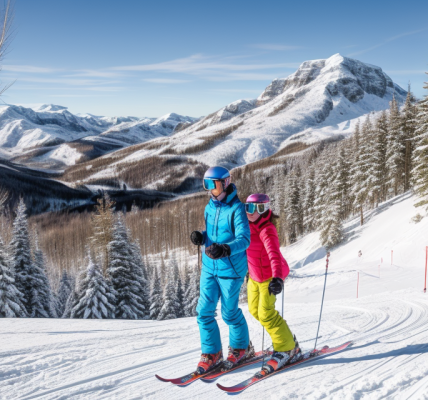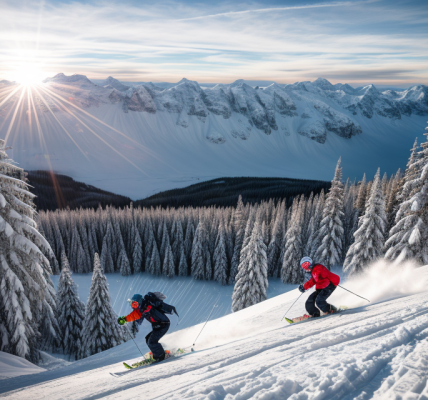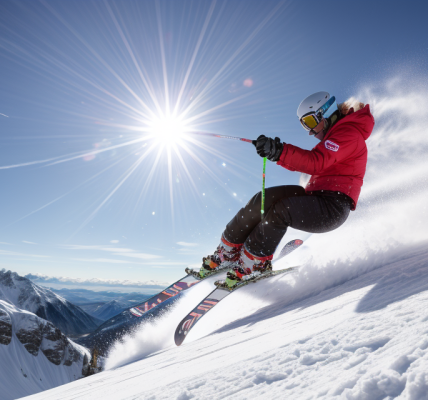Are you new to skiing or wondering how to determine your ski skill level? With so many different skill levels, it can be hard to know where you fit in. Whether you’re a beginner or an experienced skier, it’s important to know your ski skill level to ensure you have the best possible experience on the slopes. In this article, we’ll guide you through the process of determining your ski skill level and provide tips on how to improve your skills. So, get ready to hit the slopes with confidence and style!
To determine your ski skill level, you should start by assessing your abilities on the easiest runs at the ski resort. If you can confidently navigate these runs, you may be a beginner. If you can handle more challenging runs, you may be an intermediate skier. Advanced skiers can handle the most difficult runs and may also have experience with off-piste skiing and other advanced techniques. It’s important to remember that skiing is a sport that requires practice and patience, so don’t be discouraged if you’re not at the level you want to be right away. Keep practicing and taking lessons to improve your skills over time.
Factors Affecting Ski Skill Level
Physical Conditioning
- Strength and endurance: Skiing requires a certain level of physical strength and endurance. Weak muscles can lead to fatigue and a lack of control, while strong muscles provide better control and stability. It is important to incorporate exercises that target the legs, core, and upper body to improve overall strength and endurance. Examples of such exercises include squats, lunges, and planks.
- Flexibility and balance: Good flexibility and balance are crucial for skiing. Flexibility allows for better movement and control, while balance helps prevent falls. Incorporating exercises that focus on flexibility and balance, such as yoga or Pilates, can help improve these aspects.
- Cardiovascular fitness: Skiing can be an aerobic activity, requiring a certain level of cardiovascular fitness. Improving cardiovascular fitness through activities such as running, cycling, or swimming can help improve skiing performance. Cardiovascular fitness helps increase endurance and reduce fatigue, which can lead to better skiing.
Technical Ability
Technical ability refers to the level of proficiency a skier has in performing various maneuvers and techniques on the slopes. This factor is crucial in determining one’s ski skill level as it requires a combination of physical and mental abilities. Here are some of the key components of technical ability:
Equipment Knowledge
Having a good understanding of the equipment used in skiing is essential in developing technical ability. This includes knowledge of how to properly adjust and maintain ski equipment, such as adjusting bindings and waxing skis. Skiers who have a solid understanding of their equipment are better equipped to handle different terrains and conditions, making them more technically proficient.
Snow Surface Awareness
Snow surface awareness refers to the ability to identify and understand the different types of snow and their effects on skiing. For example, a skier who knows how to adjust their skiing style based on the type of snow they are on (e.g. powder, ice, or packed snow) will have a higher level of technical ability than someone who does not.
Terrain Selection
Selecting the right terrain is critical in developing technical ability. Skiers who choose terrain that is too challenging may struggle to maintain control and develop bad habits, while those who choose terrain that is too easy may not challenge themselves enough to improve. Therefore, selecting terrain that is appropriate for one’s skill level is crucial in developing technical ability.
Psychological Factors
Confidence
Confidence plays a significant role in determining one’s ski skill level. When individuals have high confidence in their abilities, they tend to be more willing to take risks and try new things, which can lead to faster progress in their skiing. On the other hand, those who lack confidence may be more hesitant to try new techniques or push themselves, which can limit their potential for improvement. Therefore, it is essential to develop a positive mindset and cultivate self-belief when learning to ski.
Mental preparation
Mental preparation is another crucial factor that affects ski skill level. Before hitting the slopes, it is important to set clear goals and visualize success. This can help individuals stay focused and motivated throughout their skiing session, enabling them to make progress more efficiently. Additionally, adopting a growth mindset can be beneficial, as it allows individuals to view challenges as opportunities for growth and learning, rather than as threats to their ego.
Learning style
An individual’s learning style can also impact their ski skill level. Some people may learn best through trial and error, while others may benefit from a more structured approach. Understanding one’s learning style can help individuals tailor their skiing practice to their needs, allowing them to make the most of their time on the slopes. For example, those who prefer a more hands-on approach may benefit from working with a ski instructor who can provide personalized feedback and guidance. On the other hand, those who prefer a more independent approach may find it helpful to watch instructional videos or read books on ski technique.
Assessing Your Ski Skill Level
Self-Assessment
One of the most effective ways to determine your ski skill level is through self-assessment. By identifying your personal strengths and weaknesses, setting realistic goals, and seeking feedback from peers, you can gain a better understanding of your skiing abilities and work towards improving them.
Identifying Personal Strengths and Weaknesses
To start, take some time to reflect on your skiing experience and abilities. Think about what you do well and what areas you need to work on. For example, if you feel confident skiing on green runs but struggle on black runs, you may have a higher skill level on easier terrain but lower skills on more challenging slopes.
It’s also important to consider your comfort level on different types of terrain, such as steeps, trees, or backcountry. Identifying your strengths and weaknesses can help you focus your efforts on areas where you need the most improvement.
Setting Realistic Goals
Once you have a better understanding of your skiing abilities, it’s time to set realistic goals for yourself. Consider what you want to achieve in terms of skiing ability and what steps you need to take to get there.
Setting achievable goals can help you stay motivated and focused on improving your skiing skills. It’s important to remember that progress takes time and consistent effort, so be patient with yourself and celebrate small victories along the way.
Seeking Feedback from Peers
Finally, seeking feedback from peers can provide valuable insight into your skiing abilities. Ask other skiers what they think of your skiing ability and what areas they think you could improve on. You can also ask an instructor or coach for feedback during a lesson or on the mountain.
Remember that constructive criticism is an important part of improving your skiing skills, so be open to feedback and use it to help you grow as a skier.
Overall, self-assessment is a crucial step in determining your ski skill level. By identifying your strengths and weaknesses, setting realistic goals, and seeking feedback from peers, you can gain a better understanding of your skiing abilities and work towards improving them.
Professional Assessment
When it comes to determining your ski skill level, seeking the advice of a professional ski instructor is a valuable option. By working with an experienced ski instructor, you can gain a more accurate assessment of your abilities and receive personalized guidance on how to improve your skiing technique.
One way to obtain a professional assessment is by participating in a ski school program. Ski schools often have instructors who are highly trained and experienced in evaluating skiers’ abilities and providing customized instruction based on each individual’s skill level. In a ski school program, you can expect to receive a comprehensive evaluation of your skiing technique, as well as guidance on how to improve your performance on the slopes.
Another option for obtaining a professional assessment is by utilizing ski performance tracking technology. This technology allows ski instructors to analyze your skiing technique in real-time, providing immediate feedback on areas that need improvement. With the help of this technology, ski instructors can provide a detailed analysis of your skiing style, including information on your speed, turn shape, and balance. This information can be used to develop a customized training program that is tailored to your specific needs and goals.
Overall, seeking a professional assessment is a valuable way to accurately determine your ski skill level and receive personalized guidance on how to improve your skiing technique. By working with an experienced ski instructor, participating in a ski school program, or utilizing ski performance tracking technology, you can gain a deeper understanding of your skiing abilities and take your skills to the next level.
Developing Your Ski Skill Level
Establishing Goals
Defining your short-term and long-term objectives is crucial for determining your ski skill level. It allows you to set specific, measurable, attainable, relevant, and time-bound (SMART) goals. This ensures that your objectives are well-defined and realistic, providing a clear direction for your skiing progress.
Focusing on specific areas for improvement
Identifying the aspects of your skiing technique that require improvement is essential for skill development. It enables you to concentrate on enhancing particular skills, such as turning, stopping, or maintaining balance, rather than trying to improve everything at once. By targeting specific areas, you can effectively allocate your time and energy towards achieving noticeable progress.
Aligning goals with personal motivation
It is important to align your skiing goals with your personal motivation. This helps ensure that you remain committed and enthusiastic about your skiing journey. Understanding what drives your passion for skiing and what aspects of the sport you enjoy most can help you set goals that are both challenging and fulfilling. When your goals are aligned with your motivation, you are more likely to stay motivated and dedicated to improving your skiing skills.
Training Program
To determine your ski skill level, it is important to have a structured training program that focuses on physical conditioning, technical drills, and mental preparedness. Here are some details on each aspect of the training program:
Physical Conditioning Exercises
Physical conditioning exercises are essential for building the strength, endurance, and flexibility needed for skiing. These exercises can include activities such as running, cycling, and weightlifting. It is important to include exercises that target the muscles used in skiing, such as the legs, core, and upper body. Additionally, it is important to focus on improving your cardiovascular fitness, as this will help you ski for longer periods of time with less fatigue.
Technical Drills and Exercises
Technical drills and exercises are designed to improve your skiing technique and increase your skiing efficiency. These exercises can include activities such as balance exercises, drills that focus on body positioning and posture, and exercises that help you develop better edge control. By focusing on these technical aspects of skiing, you can improve your overall skiing ability and reduce your risk of injury.
Practicing Mental Preparedness Techniques
Mental preparedness is a critical aspect of skiing, as it can help you stay focused, manage your fears, and perform at your best. To develop your mental preparedness, it is important to practice techniques such as visualization, relaxation, and positive self-talk. For example, you can visualize yourself skiing successfully, practice deep breathing to reduce your stress levels, and use positive affirmations to boost your confidence. By developing your mental preparedness, you can improve your overall skiing performance and enjoy your time on the slopes.
Seeking Feedback and Evaluation
One of the most effective ways to determine your ski skill level is by seeking feedback and evaluation from instructors and peers. Here are some strategies you can use to gather constructive feedback:
Regularly seeking feedback from instructors and peers
- Schedule regular lessons with a professional ski instructor who can assess your skiing ability and provide personalized feedback on your technique, style, and performance.
- Join a ski club or community where you can ski with other advanced skiers who can offer constructive feedback and support.
- Participate in group lessons or clinics designed for skiers at your skill level, where you can learn from experienced instructors and other participants.
Video analysis of skiing performance
- Record yourself skiing using a camera or smartphone mounted on your helmet or ski pole.
- Analyze the footage with a friend or instructor who can provide feedback on your technique, balance, and line choice.
- Identify areas where you can improve, such as body position, edge control, or turn shape, and work on these skills during your next ski session.
Continuous self-evaluation and reflection
- Take the time to reflect on your skiing performance after each session.
- Ask yourself questions such as: How did I feel during the run? What worked well? What could I improve?
- Keep a ski journal or use an app to record your thoughts, goals, and progress over time.
- Regularly review your journal or app to track your progress and identify areas where you can continue to develop your ski skills.
FAQs
1. How can I determine my ski skill level?
Determining your ski skill level can be done by assessing your abilities on the ski slopes. You can start by asking yourself a few questions:
* Can I ski on green runs (beginner slopes) with ease?
* Can I ski on blue runs (intermediate slopes) with control and confidence?
* Can I ski on black runs (advanced slopes) with speed and style?
* Can I ski on steep and challenging terrain?
* Can I ski in different snow conditions (such as fresh powder or icy conditions)?
If you can answer yes to most of these questions, then you may have an advanced skiing skill level. On the other hand, if you struggle with basic skiing skills such as turning, stopping, or maintaining balance, then you may be a beginner skier.
2. What are the different ski skill levels?
Ski skill levels are typically divided into three categories: beginner, intermediate, and advanced.
* Beginner skiers are those who are new to skiing or have limited experience. They may struggle with basic skiing skills such as turning, stopping, and maintaining balance.
* Intermediate skiers have some experience on the slopes and can ski on green and blue runs with control and confidence. They may also be able to ski on some black runs, but may need to take it slow and be cautious.
* Advanced skiers are those who have extensive experience on the slopes and can ski on all types of terrain, including steep and challenging runs. They may also be able to ski in different snow conditions and can do so with speed and style.
3. How can I improve my skiing skills?
Improving your skiing skills requires practice and patience. Here are a few tips to help you improve:
* Start with the basics: If you are a beginner skier, focus on mastering the basics such as turning, stopping, and maintaining balance. Take lessons from a professional ski instructor who can help you develop good skiing habits.
* Practice regularly: The more you ski, the more your skills will improve. Try to ski as often as possible, especially during the winter months when the ski resorts are busiest.
* Challenge yourself: Once you have mastered the basics, challenge yourself by skiing on more difficult terrain. Start with green and blue runs and gradually work your way up to black runs.
* Take lessons: Even if you have been skiing for years, taking lessons can help you improve your skills. Ski instructors can help you identify areas where you need improvement and provide tips on how to improve your technique.
* Have fun: Skiing should be fun! Don’t put too much pressure on yourself to improve quickly. Enjoy the experience and let your skills develop naturally over time.




